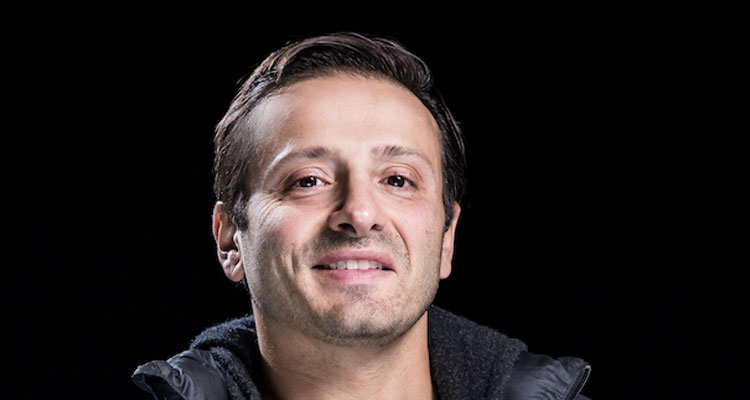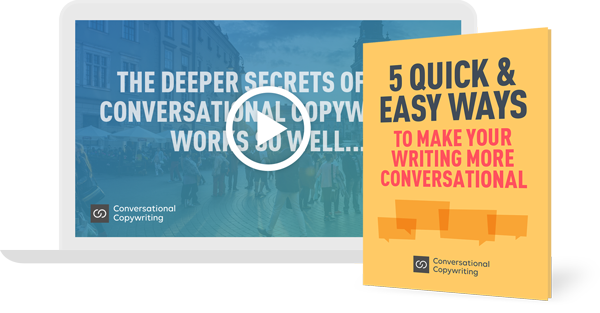
In this post I get to talk with Yanik Silver – serial entrepreneur, adventurer, doodler and advocate for ethical and evolved business.
I’ve been following Yanik Silver’s career for close to 20 years now, watching from afar as he journeyed from online copywriter and trainer to becoming a powerful advocate for a more evolved approach to business.
But… we never met until a few weeks ago, when we were both speaking at the same event.
I’d imagined his presentation might focus on sharing tried and tested techniques for online copywriters.
But I was dead wrong.
Instead, Yanik treated us to a vision of a world where business moves from being merely transactional to becoming transformational… where marketing is as much about making a positive impact on the world as it is about growing the bottom line.
Those of you who are familiar with my own vision for Conversational Copywriting will immediately grasp why I was so taken with Yanik’s presentation.
And you’ll understand why I asked him to take part in this interview.
So… let’s get started…
NICK: Yanik, hi. It was such a pleasure to meet you. As soon as I saw your presentation, I knew the people who follow this blog would want to hear about your work.
At the very beginning of your presentation you said, “Businesses without a core IMPACT will be at a competitive disadvantage in 4-7 years (or less).”
Can you explain what you mean by that?
YANIK: Absolutely. There is a seismic shift happening.
It’s going on from the outside in with customer buying criteria changing … and from the inside out with employees. People will pay the same or more for a brand with purpose.
Plus, the largest living segment of our economy, millennials, represent $2.45 trillion in spending power and is 60% more likely to engage with brands that discuss and act on social causes, according to Cone Communications.
The greatest competitive advantage available to you right now for just about any business or someone just starting out with a big dream in front of them.
However, I must warn you this is not some “flavor-of-the-month” tactic to sprinkle into your venture. It has to come from a genuine, authentic desire to make a greater impact in the world. Otherwise, applying the Evolved Enterprise framework will only fast forward your demise because of greater transparency and scrutiny.
NICK: I get that. It’s the difference between truly believing in what you’re doing, and acting “as if” you believe in what you’re doing.
In your book – Evolved Enterprise – you say, “With my background as a copywriter, I’m pretty careful about most of the words I choose. In fact, it’s your words (and even your internal dialogue) that have a tremendous impact on how you think, feel, and behave.“
I totally agree. I think the person we become is defined, in part, by the language we use today.
Is the same true of a company, even a large business? Can the language a company uses in its marketing not only express its current values, but also define its future?
YANIK: I believe your words create your world! And it’s no different for a company. In fact, I’ll start with a little rant.
I used to say “give back” was one of the key concepts of the Maverick Entrepreneur philosophy. (It even says so right on the cover of my 34 Rules for Maverick Entrepreneurs book: “Make More Money, Have More Fun and Give More Back.”)
I’ve now realized this isn’t quite right.
I assert that entrepreneurs and businesses can only succeed by providing and delivering value.
Period.
End of story.
It’s simply a universal law. In fact, one of my core values in my very first journal said, “I get rich by enriching others 10x – 100x what they pay me in return.” There’s no other way that it could possibly occur, because in the long run, the marketplace is always self-correcting.
The words companies use define what they care about, how customers talk about them, how team members interact and so much more. And there are so many spots to consider what meaningful words you want to use. Even little spots you might not think about.
Consider, Hail Merry, an organic snack company uses the words, “We celebrate our ingredients” on the label. So much more impactful showcasing their pure ingredients.
NICK: I love this quote of yours, “It seems that people just feel relieved when they discover that they really can live up to their highest passions and ideals and create a business that aligns with their souls AND make more profits in the process.”
I’ve found the same with companies that take on the Conversational Copywriting approach. They feel relieved to discover they can make sales without being sleazy or manipulative about it.
Which makes me wonder… are we both tapping into a broader trend, where people feel less willing to compromise their personal values, just because they’re “at work”?
YANIK: For some reason we’ve developed these expressions like, “It’s just business.” Guess what – it’s not just business. It’s your life. It’s your reputation. It’s what you put out into the world.
I think the issue of justifying this misalignment is because you have to suspend disbelief for just one moment.
Just be open to what I’m going to share with you because on the surface this appears to be way too good to be true. It’s the idea that your business could actually make more profits while making a real impact.
I know because when I finally figured this out (the hard way), we ended up with a 823% profit jump over a 3-year period.
Simply being open to the fact that this CAN happen opens you up to the HOW.
NICK: In your book you talk about putting “full effort” into ethically making the sale.
To me, that’s a key point. When I talk to people about taking a more transparent and honest approach to copywriting, they sometimes interpret that to mean that I’m going to hold back on trying to make the sale. But that’s not what I mean at all.
Can you describe for us how we can put in that “full effort” without compromising our principles or ethics?
YANIK: By “full effort,” I mean using all the persuasive and influence concepts we understand as copywriters, but not doing it in a way that makes you feel like you are bypassing the truth.
Some people who start seeing the Evolved Enterprise® model believe if their companies are making an impact than they their product or service will sell itself. That’s not the case. You still need to make a compelling offer, have a great hook, provide compelling evidence it works, create a clear reason to act, etc.
But if you have that core impact, it can actually turbo-charge your marketing and give you a bigger hook!
NICK: That’s absolutely been my own experience with Conversational Copywriting. It’s nice to think that just because you have what you think is a great product that people will automatically buy it. Not true. Even with a great product, you still need a compelling sales message.
Staying with Conversational Copywriting for a moment… I like to think my course is having a positive impact on marketing. Even if only a small one.
What more could I do? What steps might I take to become a more evolved business? I’ve thought about partnering with a non-profit that supports literacy. But if you can see opportunities I’m missing, I’d love to hear about them. Any ideas?
YANIK: This is an important question that many entrepreneurs wrestle with. There are two ways of considering the cause element, either what you personally want to support and/or what do my customers want?
And then are multiple ways of making that happen. Some companies simply choose to provide a percentage donation, or you can include a specific dollar amount or impact action for each product sold. Or, you can look at how can I fully incorporate this into my business?
Who knows, what if the impact element was the way students of conversational copy would be become mentors to aspiring writers from inner cities? As you know you get better at learning by teaching. There is a whole host of ways of adding more impact.
NICK: I love that idea. I’ll raise it with my students during our next video meeting.
You’re working hard to spread the word about your work with Evolved Enterprise… which I know goes way beyond the book you wrote.
Can you tell us a little about that, and let people know where they can find out more?
YANIK: Absolutely. On Amazon.com or EvolvedEnterprise.com we have a limited edition set with proceeds going to support Village Enterprise, one of my favorite partners doing incredible working training micro-enterprises in East Africa. Or, they can check me out on Twitter or Instagram @yaniksilver.
NICK: That’s great. Thank you. I really appreciate you taking the time to talk about this. Like you, I think it’s a really important topic. If there’s ever any way in which you think I can contribute to your own mission, please let me know.
YANIK: It’s my pleasure – thank you for being on a similar path Nick!
Yanik Silver is the author of several best-selling marketing books and tools including Maverick Startup, Instant Sales Letters®, 34 Rules for Maverick Entrepreneurs, and Evolved Enterprise. Yanik’s lifetime goal is to connect visionary leaders and game changers to catalyze innovative business models and new ideas for solving 100 of the world’s most impactful issues by the year 2100. Leveraging business as a multiplier for good.

Thank you for sharing this interview. Yanik’s vision raises all our hopes.
Hi Nick, thanks for sharing Yanik’s interview. I have purchased some of this books and platforms over the years. I did meet Yanik a few years back in Los Angeles when he gave a presentation. His parents are from Russia and I have family & friends in Russia, so we had a connection of sort. The point Yanik made concerning conversational style – copywriting and making the sale or pitch in a transparent manner was important. No matter how great the product is, you still need a compelling sales message to close the sale. You need to prove and show results in the content message….continuing a conversational style.
Interesting interview. I’m considering marketing myself to non-profits. I wonder what impact that my knowledge of conversational copywriting would have for these organizations. How would conversational copywriting help non-profit organizations achieve their goals? Would conversational copywriting help raise more awareness of what these organizations are trying to achieve? This leaves a lot to think about.
Sheila, hi. I think conversational copywriting is a perfect fit for non-profits. Non-profit copywriting is almost always about touching people at an emotional level. Tough to do with marketing hype or business writing… but a natural fit with the conversational approach.
Nick, thank you.